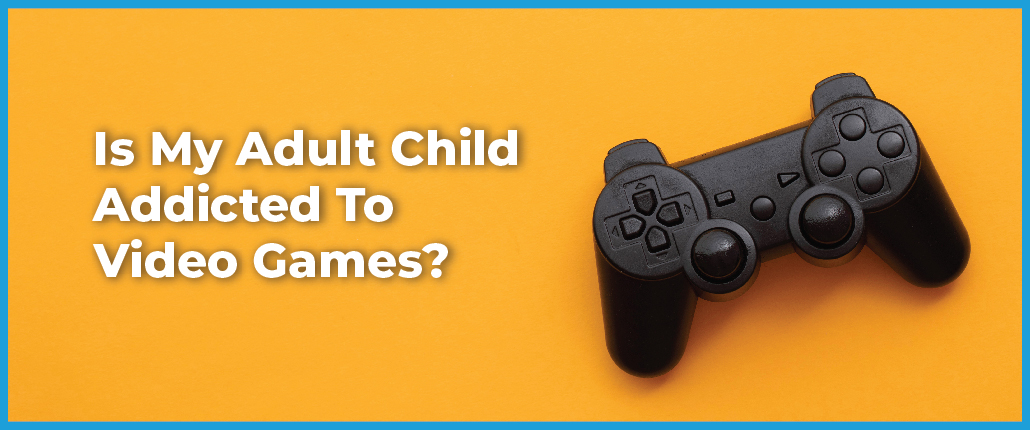
Is My Adult Child Addicted To Video Games?
If you are a parent of a young adult who spends most of their time playing video games, you are not alone. It is now such a common issue that there is a national support group, olganon, for parents of adult children with video game addiction. On-Line Gamers Anonymous, OLGA) is a growing organization whose sole purpose is to help people whose lives have been consumed by video gaming. OLGA offers support to adult gamers, and their families and loved ones. They provide help and resources for overcoming excessive gaming and rebuilding lives. OLGA’s mission statement is, “Sharing our experience, strength, and hope to support each other in recovery from problems resulting from excessive gaming.”
Is my adult child addicted to video games?
OLGA has questions for people to determine if in fact their adult child is addicted to gaming. For example:
- Has gaming significantly interfered with your adult child’s life in terms of education (failing grades, frequent absences?)
- Has gaming significantly affected your adult child’s health (weight gain due to inactivity or weight loss due to not eating, back pain due to prolonged sitting?)
- Has your family relationships been significantly impacted (skipping family activities, holed up in their room, anger and hostility when gaming is interrupted?)
- Has your adult child’s social relationships been significantly impacted (friends slipping away, no longer participating in sports/activities/hobbies?)
- Has your adult child’s employment been significantly impacted (inability to hold a job, frequent absenteeism from work?)
If you answer “yes” to most of these questions, your adult child might have a video game addiction. So, what can a parent do?
What parents can do:
If an adult child is living at home, parents are still in charge and make the rules. Typically parents try to get their adult child to limit their gaming time but that rarely works. Another strategy often employed is to use parental control programs but these are easily hacked by a video gamer. If a person is truly addicted to gaming, it is incredibly difficult, if not impossible, to reduce the amount spent playing video games.
Experts in the field of video game addiction suggest that if parents truly want to try to get their adult child to reduce their game time, then a contract should be created that clearly states how much time will be allowed, what must be done to earn the gaming time, and the specific consequences for exceeding the limits. The first time the contract is broken should be the last time your adult child plays video games in your home – period. No arguing, no excuses.
What parents need to do to remove gaming entirely:
- Remover the computer and internet connection from the adult child’s room. Install the main internet connection in the parent’s bedroom and lock the door when you are not home. Remember, it is the parents home and parents make the rules.
- Help your child to find something else to fill their time. Encourage your child to pursue a new or previously enjoyed hobby, get involved with volunteering, seek employment, or take a class at the local community college. For more suggestions, read “101 Things To Do Instead Of Gaming.” and “What I Did Today Not To Game.”
Consider Professional help:
If you think your adult child is struggling with depression, anxiety, or any other mental health challenges, especially if these symptoms existed before the addiction, consider seeking professional help. If possible, find a professional who specializes in addiction.
Further, be aware that an addicted video gamer will experience withdrawal syndrome when the games are removed. Typical and normal reactions range from restlessness, irritability, and anger to sleeping for hours and hours. Experts say that it can take up to 30 days for the craving to play a video game will decrease. Some parents who have experienced their adult child’s video game withdrawal suggest that gamers not be left alone during the initial weeks of game removal.
Important Advice From OLGA:
Parents should be sympathetic to their adult child’s emotions regarding video game addiction. The games were designed by experts using psychological principles to draw people in and keep them playing. This is not your child’s fault. It is not a moral issue or a character judgment. It is also not the parent’s fault. Addiction often blindsides all of us. Remind yourself that you are a good parent who wants to help your child. Reach out to OLGA and to your own mental health professional for support. Trust that you will all come out on the other side stronger and more self-aware.

Jeri Rochman, JD, MS
Jeri Rochman, JD, MS, is the Advance LA Director of Community Outreach, a Life Skills Coach, National Board Certified Counselor and Certified Parent Educator. Interested in learning more about Advance LA’s services?